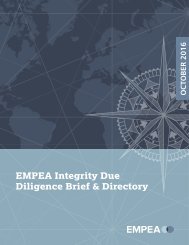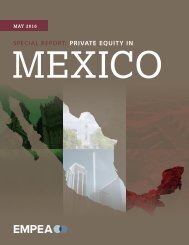You also want an ePaper? Increase the reach of your titles
YUMPU automatically turns print PDFs into web optimized ePapers that Google loves.
2.2 Policy Issues Related to Onshoring<br />
the PE Industry<br />
The prospects for onshoring financial services need to<br />
be assessed against the evolving development needs<br />
<strong>of</strong> financial markets in Africa. With recent years’ growth<br />
in their asset base institutional investors, predominantly<br />
pension funds in countries such as Nigeria and Kenya, 8 are<br />
increasingly constrained in their investment choices. They<br />
are too heavily exposed to government securities, bank<br />
deposits and real estate. Recently investment guidelines<br />
have been modified so as to allow limited investment in PE<br />
funds (e.g., in Nigeria and Kenya). 9<br />
Two questions here are: (a) whether pension fund investors<br />
are better serviced by locally-domiciled PE funds; and (b)<br />
what efforts could be made to enhance the size <strong>of</strong> the PE<br />
industry so as to satisfy increasing investor demand.<br />
Important questions arise as to whether (and if so, how)<br />
efforts should be made to encourage the development <strong>of</strong><br />
the local PE industry. Would local institutional investors be<br />
better served, were PE funds to have an onshore rather<br />
than an <strong>of</strong>fshore domicile? In the country <strong>of</strong> domicile this<br />
would make investment by local institutional (and indeed<br />
retail) investors much simpler, since investment in PE<br />
funds would become local and would not involve ‘roundtripping’<br />
through an <strong>of</strong>fshore centre that most likely will raise<br />
concerns among regulators and trustees. Nonetheless, for<br />
the foreseeable future local pension funds and their trustees<br />
might not be comfortable buying locally-domiciled PE funds<br />
—they realise that the reputation and efficiency <strong>of</strong> <strong>of</strong>fshore<br />
domiciled PE funds would serve them better.<br />
The Nigerian authorities are trying to encourage the<br />
establishment <strong>of</strong> a locally-domiciled PE industry by<br />
mandating that eligible PE funds be domiciled locally and<br />
that PE funds invest 75% <strong>of</strong> their funds locally. Given the<br />
reputation <strong>of</strong> Nigerian market institutions and the costs <strong>of</strong><br />
doing business in Nigeria, there are considerable costs<br />
associated with these efforts to ‘encourage’ the onshoring<br />
<strong>of</strong> the PE industry, which will be borne by pension savers. 10<br />
Another policy issue is whether expansion <strong>of</strong> the PE<br />
industry in Africa detracts from the development <strong>of</strong> local<br />
capital markets. Despite the increasing demand coming<br />
from institutional investors there is a dearth <strong>of</strong> local<br />
investment opportunities. In part this reflects the preference<br />
<strong>of</strong> owners <strong>of</strong> medium- and larger-scale local enterprises<br />
for investment by major international PE funds. Were such<br />
enterprises to issue local IPOs, they would need to observe<br />
transparency requirements associated with being listed,<br />
such as disclosure <strong>of</strong> financial information and scrutiny by<br />
the tax authorities.<br />
Thus, in the case <strong>of</strong> such more established enterprises—<br />
rather than expanding the frontier <strong>of</strong> available risk-capital<br />
available to local entrepreneurs—funding provided through<br />
PE funds <strong>of</strong>ten takes the form <strong>of</strong> ‘replacement financing’<br />
and can be regarded as a substitute for local IPOs, and<br />
thereby as a vehicle for facilitating transfer <strong>of</strong> potentially<br />
sound investment returns from local to foreign investors. It<br />
can be argued that the activities <strong>of</strong> PE funds actually inhibit<br />
/ crowd out the development <strong>of</strong> local capital markets.<br />
Even in more developed markets PE is <strong>of</strong>ten regarded as<br />
“sucking life out” <strong>of</strong> issuance on the exchange. With the<br />
extreme scarcity <strong>of</strong> new issuance and the limited supply <strong>of</strong><br />
viable and growing medium to large enterprises in Africa,<br />
the likelihood is that the potential damage caused by the<br />
PE industry could be serious. 11 Altogether, unless the<br />
PE funds are addressing a particular gap in the funding<br />
available to small enterprises, the question is whether<br />
donor efforts could be better spent on facilitating IPOs and<br />
thereby stimulating the development <strong>of</strong> the local capital<br />
market. Only if PE funds do provide risk-capital to SMEs<br />
that are too small to be listed would they appear to be<br />
unequivocally beneficial.<br />
8<br />
Kenya and Nigeria are referenced here because they have undertaken significant pension reforms in recent years, whereby pension savings are<br />
fully-funded and privately managed. For more discussion about PE fund investment by pension funds in Africa see “Pension Funds and Private Equity:<br />
Unlocking Africa’s Potential,” EMPEA, Making Finance Work for Africa and Commonwealth Secretariat, 2014.<br />
9<br />
The regulations in Kenya and Nigeria stipulate that pension funds can invest 10% and 5% (respectively) <strong>of</strong> their assets in PE. The Nigerian regulations<br />
require that pension assets are invested in locally domiciled PE funds that invest 75% <strong>of</strong> their assets in Nigeria. The Kenyan regulations also prohibit<br />
investment by pension funds in <strong>of</strong>fshore PE funds.<br />
10<br />
Indeed several larger Nigerian PE fund managers have established ‘mirror’ PE funds catering specifically to the needs <strong>of</strong> local pension fund administrators<br />
(PFAs). These funds are registered locally, and – as one would expect – they face additional costs associated with operating in the local ‘ecosystem.’ These<br />
relate to fund administration (e.g., fund registration with the SEC typically takes two years), legal uncertainty (e.g., law defining limited partners only being on<br />
the statutes <strong>of</strong> the state <strong>of</strong> Lagos) as well as undue regulatory burdens and bureaucratic delays, see further discussion in Section 3.<br />
11<br />
Recent dialogue with the heads <strong>of</strong> the stock exchanges in East Africa confirms that this is indeed a major cause <strong>of</strong> concern.<br />
<strong>Conduits</strong> <strong>of</strong> <strong>Capital</strong> – Onshore Financial Centres and Their Relevance to African Private Equity<br />
| 89





